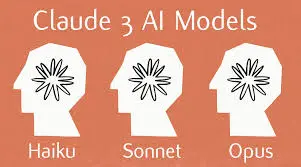Claude 3 isn’t just one model—it’s a lineup: Opus, Sonnet, and Haiku.
- What Is Claude 3? A Quick Overview
- Claude 3 Opus – The Most Powerful Model
- Claude 3 Sonnet – Best for Everyday Use
- Claude 3 Haiku – Fastest and Lightest
- Speed Comparison: Which One’s the Fastest?
- Accuracy & Reasoning Power
- Best for Writing and Content Work
- Best for Coding and Technical Work
- Context Window Comparison
- Pricing Breakdown (API Users)
- Which Claude Model Is in the Free Web App?
- Best Claude Model for Beginners
- Which One Should You Use? (Quick Chart)
- Final Thoughts: Use the One That Fits
Each one is built for a different kind of user. Opus is the smartest.
Haiku is the fastest. Sonnet sits right in the middle—and it’s the one most people will use by default.
If you’re wondering which one to try (or upgrade to), this guide breaks it down without the tech talk.
You’ll know exactly which Claude model fits your needs by the end.
Let’s get into it.
What Is Claude 3? A Quick Overview

Claude is an AI chatbot made by Anthropic—a direct competitor to ChatGPT.
Claude 3 is the latest version, and it comes in three levels:
• Opus – the most powerful
• Sonnet – the balanced one
• Haiku – the fastest and lightest
You can use Claude for writing, coding, research, chatting, and more—just like ChatGPT.
The model you choose affects how smart, fast, or affordable your results will be.
Claude 3 Opus – The Most Powerful Model
Claude 3 Opus is the smartest model in the lineup.
It’s designed for hard tasks that need deep thinking.
Use it for:

• Writing complex documents
• Deep research
• Solving hard problems
• Writing or reviewing code
• Running smart AI agents
It’s also the most expensive and a bit slower than the others.
Best for:
Advanced users, developers, and anyone doing serious work.
Claude 3 Sonnet – Best for Everyday Use
Claude 3 Sonnet is the all-rounder.
It’s fast, smart, and free to use on Claude.ai.
Use it for:
• Writing blogs, emails, social posts
• Summarizing documents
• Brainstorming ideas
• Quick research or explanations
It’s good enough for most people and fast enough for daily use.
Best for:
Students, creators, business owners—basically everyone.
Claude 3 Haiku – Fastest and Lightest
Claude 3 Haiku is built for speed.
It’s the smallest model, so it’s not as smart as Sonnet or Opus, but it’s great for quick replies and low-cost tasks.
Use it for:

• Chatbots
• Instant answers
• Autocomplete tools
• Simple Q&A or tagging
Best for:
Apps that need fast, low-cost responses behind the scenes.
Speed Comparison: Which One’s the Fastest?
• Haiku is lightning fast
• Sonnet is fast and still smart
• Opus is slower, but handles complex stuff better
If speed is your top priority, go with Haiku or Sonnet.
Accuracy & Reasoning Power
Here’s how they stack up when it comes to thinking and solving:
• Opus = smartest
• Sonnet = smart enough for most tasks
• Haiku = simple and quick, but not deep
Opus is better at reasoning, coding, and long answers.
Best for Writing and Content Work
• Sonnet is your go-to for content writing—fast and reliable
• Opus is better for writing that needs structure, tone, or research
• Haiku is okay for outlines or simple ideas, not detailed writing
Best pick: Sonnet. It gets the job done without slowing you down.
Best for Coding and Technical Work
• Opus can handle full apps, explain code, fix bugs
• Sonnet is solid for smaller code tasks or explanations
• Haiku isn’t meant for coding
Best pick: Opus if you code often.
Sonnet if you just need help sometimes.
Context Window Comparison
This tells you how much info each model can “remember” at once.
• Opus & Sonnet support up to 200K tokens (huge!)
• Haiku has a shorter memory span but runs fast
If you’re working with long documents, go with Opus or Sonnet.
Pricing Breakdown (API Users)
If you’re using Claude through the API, here’s how pricing usually looks:
• Opus = most expensive
• Sonnet = mid-range
• Haiku = cheapest
If budget matters, start with Sonnet or Haiku depending on task type.
Which Claude Model Is in the Free Web App?
• Claude.ai (free) uses Sonnet
• Claude Pro ($20/month) gives you Opus access
• No download, no setup—just sign in and start chatting
Best Claude Model for Beginners
Here’s the easy answer:
• Start with Sonnet (it’s free and smart)
• Upgrade to Opus only if you need more power
• Use Haiku if you’re building tools or apps that need speed
Which One Should You Use? (Quick Chart)
Goal or Task Best Model
Deep thinking/research Opus
Daily tasks/writing Sonnet
Fast tools/chatbots Haiku
Coding or agents Opus
Beginners Sonnet
Final Thoughts: Use the One That Fits
You don’t need the biggest model. You need the right one for what you’re doing.
• Opus is best for power tasks
• Sonnet is great for everyday work
• Haiku is perfect for speed-focused tools
Start with Sonnet. Move up only when you need more.











